I was so excited when one of my favorite food carts, Kargi Gogo announced they were going to host a Supra dinner pop-up. I have been a fan since first visited in 2013 when they initially opened with their ode to Georgia (the Eastern European country, not the US State). Just a couple months ago the Kargi Gogo owners, husband and wife team Sean and McKinze, just celebrated the 2nd anniversary of their cart.
Sean and McKinze spent 2 years in Georgia as part of the Peace Corp, and fell in love clearly with the country, people, and the food and brought it back with them. This video from Behind the Food Carts really captures what Kargi Gogo is like as they create some of their favorite Georgian street food. You can tell they really love Georgia and love sharing this relatively unknown country and food with everyone and anyone.
Being able to expand beyond the space and kitchen in their cart for this supra was a great opportunity for me to explore more of the cuisine of Georgia, and I was really interested in how Kargi Gogo was going to be able to tell more of a story about Georgian culinary culture without the constraints of the faster service pace needed of food cart patrons at lunch. I also love the idea of a supra – which is a celebratory dinner that going into it that night, I only knew involved a lot of food, a lot of drinks and a toast before every drink.
The closest dinner party equivalent would be Thanksgiving in the US – a huge feast of food bringing together family and friends – but add in the influence of going around and around the table with toasts and drinking. And imagine that you could hold a supra for any event or holiday, it’s not just one day a year.
The $90 per person prepaid reservation, as I already knew, included seven full courses with wine pairings. I dutifully did a class at Pulse PDX and walked almost 10000 steps (not counting the Zumba class) even before I showed up for dinner in the Holdfast Dining space at 7 PM, attempting to cultivate a big enough appetite for what the parade of food I thought would ensue. I woefully did not prepare enough. I guess at least I got to experience a traditional supra side effect- restricted breathing because I was so over-full. My take home leftover container alone was probably 2 pounds and an additional 3 meals for me!
And next time, I’m definitely wearing loose clothing and not jeans. And, yes, next time – because I would definitely highly recommend this experience to anyone. Kargi Gogo did a spectacular job in successfully using food as a gateway to Georgia for all of us. Although Georgia was dominated by the Russian Empire and Soviet Union from the 19th century until the fall of the USSR, it has thousands of years of strong national identity and traditions that is unique and fascinating. Looking at the menu at the Georgian script for instance, you can see similarities to Arabic writing from Georgia’s history with Persia hundreds of years before the Russia Empire even existed.


A supra always has a tamada, or toast master, who lead the toasts throughout the evening and is the leader of the supra. Sean and McKenzie took turns in leading us to toast to Georgia, to women who are mothers and daughters and sisters and wives, to those no longer with us, to the children the future generation, to peace, to many things that I can’t recall them all since there were like a dozen toasts during the course of the supra. By the end of the evening, we all felt a sense of camaraderie and affection by being brought together by these toasts throughout the dinner, and our mutual stumbling and improvement of cheering the toast with the Georgian phrase “Gaumarjos“, pronounced “gao-oo-mar-jos”… or at least that’s what I left with.
Before each toast, Jeff Vejr, who crafted all the wine pairings and also works as the Winesman for Holdfast Dining, always explained the wine and had a story to tell about the winemaker or the wine grape or how they made the wine or similar. In the photos below, Sean is in the apron, Jeff is in the blazer and pocket handkerchief.


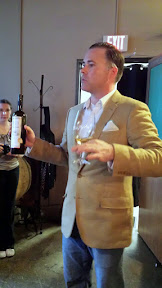
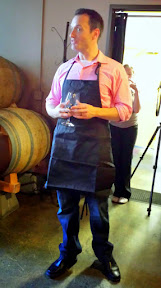

On the Table


The seats for the supra in the space were either at a communal table, or at the countertop bar – the communal table gives you the advantage of lots of conversation, while the countertop bar lets you see the food being prepared and plated. For this meal, I was at the counter. Scattered already were plates of
- Tonis puri (a Georgian bread)

- Smoked Sulguni cheese (it reminds me of the flavor of a smoked gouda but texturally is softer like provolone)

- Tomato and Cucumber Salad

- Katmis Satsivi (chicken in a walnut sauce, and one of my favorite Georgian dishes).
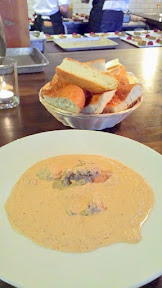

- imported Georgian adjika sauce (the redder sauce that is spicy and salty – there is a great Road & Kingdoms article about adjika here) and housemade tkemali sour plum sauce

- Borjomi natural mineral water (you can read about this legendary mineral water and how it is a symbol of the relations of Georgia and Russia at the Economist), and a housemade Tarkhuna Soda (a tarragon-flavored soda like drink)

- a Vegetable Plate of pickled sweet peppers, green onions, radishes, and assorted organic fresh herbs


- And all of these was paired with the welcoming wine of Pheasant’s Tears Kisi 2011. This is the first of several Pheasant’s Tears wines we would have during the meal – Pheasant’s Tears is located in Georgia and grows Georgian grape varietals using the ancient traditional techniques – ancient as in they are aged in qvevri, which are terracotta pots buried underground. Georgian wine is one of the oldest wine regions in the world, dating back 8,000 years, Jeff explained, including before the invention of amphoras, the portable version of qvevri that the ancient Greeks created later.
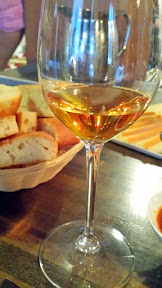
Course 1: Appetizer
It was finally time for the beautiful plates we had been looking at while nibbling on the On The Table stuff… and watching two of the chefs Brad and Keaton preparing the bread boats for the Acharuli Khachapuri, which would be the next course.
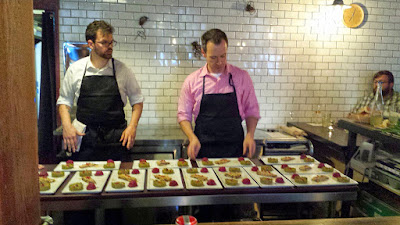
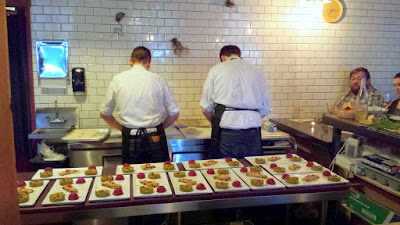
These are the Pkhali Trio that includes, eggplant (Badrijani with a walnut sauce), spinach pkhali, and roasted beets pkhali. Texturally except for the pomegranate topping, all the pkhalis were soft, reminiscent of what you might think of for pates, but all vegetable.
The dish was paired with Niki Antadze Mitsvane 2010, which you can see a hint of in the 2nd picture. Georgian white wines are not actually white or clear in color but more of this honey color (which Jeff explained are sometimes referred to as “orange wines”) because the grape juice is fermented with the pits, seeds and skins, which also provides natural preservation. I don’t really care what the color is, but I did notice that the mouthfeel of these orange wines is much rounder but without it being a red or taking on the characteristics you would get from using an oak barrel.
I was so full at the dinner that when Jeff announced that he had extra bottles for sale I was not in the state of mind to contemplate purchasing any, but now I regret it. So, if you attend these dinners, you might want to think about if any of these are unique enough to take home to experience again, but with a more manageable amount of food than a supra.
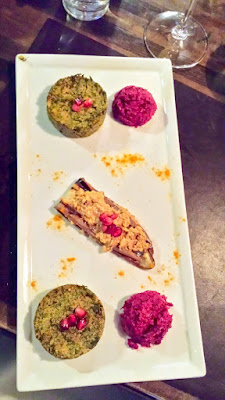
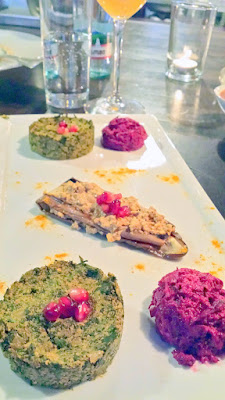

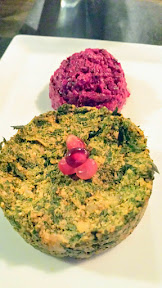
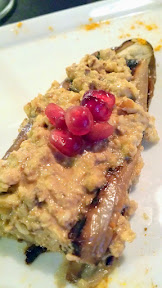
Course 2: Bread
Bread course of Acharuli Khachapuri, which is a bread boat that is filled with a sulguni cheese blend and topped with quail egg and local butter, and here is paired with Iago’s Wine Chinuri 2010. To eat it, you tear off the crusty bread around the outside and dip it into the well of gooey cheese and egg.
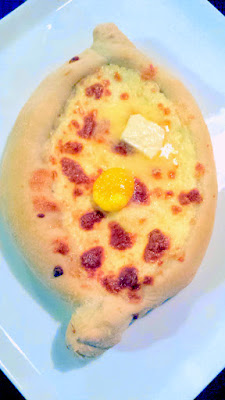
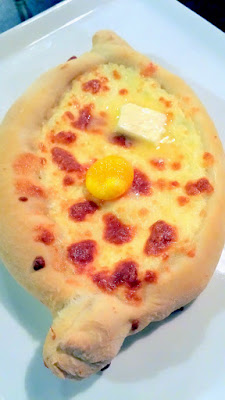
Apparently my joy and fingers full of bread and cheese got lost in the experience here and did not even take a photo of the wine. The only notes I have is that Iago’s Wine is owned by Iago, he has a white wall where visitors write their name with a sharpie, and some of the wines are sometimes called “snowglobe wines” because you might see natural sentiment in the wine instead of it being completely clear, and these natural sediments are sometimes called “wine diamonds” and “wine vitamins”.
I think I also wrote a note about Jeff being a great storyteller at this point, I was surprised later when he said he only had visited wineries for a week in Georgia. It’s really amazing how much he retained in his memory about the wines, the people, the wineries, and all the little nuggets of personality and facts to flesh out Georgian wines, which most of us know nothing about, until something I am more curious about. I had just attended DaNet (a Russian dinner popup) a few days before this supra, and this supra was everything contextually I had wished DaNet had offered more of: more educational as well as personal stories, more sharing of the culture and legacy of the country.
Course 3: Vegetable
Vegetable course of Lobio Mchadit, which is a kidney bean stew. Here, we were served a version that has all the homey comfort of the red kidney beans, onions, Georgian spices, greens but then is elevated with a sophisticated presentation with a scattering of pomegranate and some fried pieces of Bob’s Red Mill Stone Ground Cornmeal, and all paired with Okro’s Wine Rkatsiteli 2010.
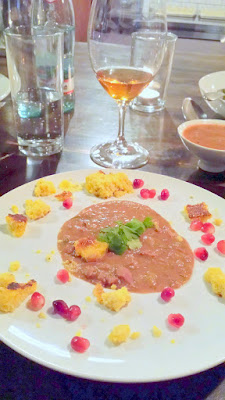

Course 4: Dumpling
The hand making of the Tskhvris Khinkali by Brad here: putting down the initial dough circle which would then be filled with the mix of Reister Farms spring lamb, Georgian Dzira spice and broth, and then pinching closed the dumpling

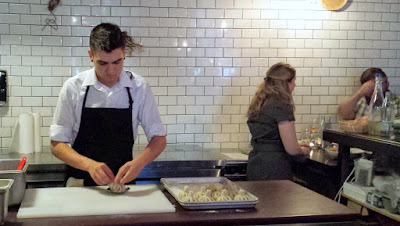


The boiled finished product, Tskhvris Khinkali, is a dumpling of dough filled with the mix of Reister Farms spring lamb, Georgian Dzira spice and broth, paired with Pheasant’s Tears Takveri Rose 2013 (look how beautiful the color is of the rose!). To eat the khinkali, you hold it by the nub at the top so it is upside down, take a small careful bite and then tilt the dumpling so you can drink the soup inside. Then, you work your way around eating the dumpling – and you choose to eat the nub or do as Georgians do, which is leave it on the plate to count how many khinkali you have accomplished.
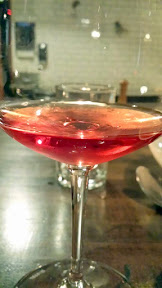


Course 5: Meat
Meat course of Khbos Chakapuli, a stew with Nicky Farms Veal, tarraton, Georgian white wine and butter, paired with Pheasant’s Tears Shavkapito 2013.


It was around this time that the kantsi, a traditional drinking horn from Georgia, made its appearance as a vessel for giving toasts and which we then passed around the room, starting with Sean.
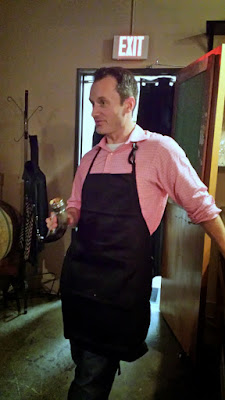
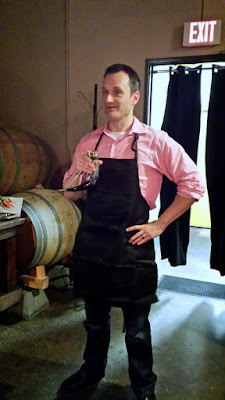
Course 6: Grill
Grill course of Ghoris Mtsvadi, a skewer of Carlton Farms Pork cooked with Georgian White Wine and Svanuri Marili that you use bread to push off the stick, then eat with housemade Tkemali Sour plum sauce or the imported Georgian Adjika sauce. This dish was paired with Pheasant’s Tears Saperavi 2013. We had been smelling the aroma of the grill for a bit now, and were happy to finally see it arrive. I know everyone at my countertop area schemed about how to take a couple nuggets of that pork home in their take home box, ha ha (we all got some).
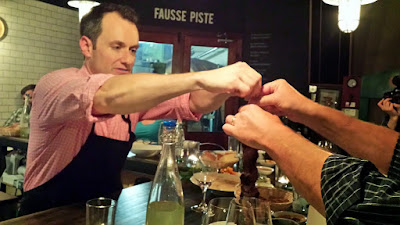
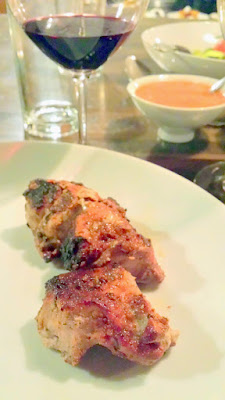
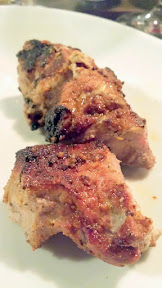
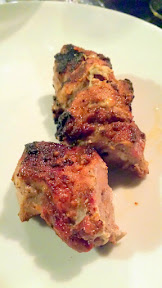
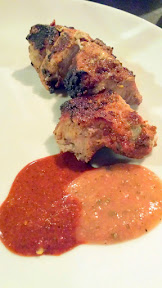
Course 7: Sweet
Finally, the sweet course of Kaklis Namtskhvari da Gozinaki, which McKinze learned from her host mother when she was with the Peace Corp. Kaklis Namtskhvari is a cake with walnuts, honey, fleur de sel, housemade whipped cream and Hood strawberries, a piece of Gozinaki (walnut honey bar) both paired with Bagrationi Classic Brut and you can see the slightly greenish yellow liquid on the left is me sipping on the housemade Tarkhuna (tarragon soda).
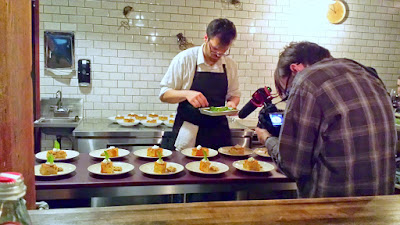

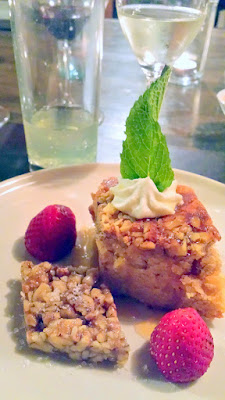
All in all, this was a long meal with a huge amount of food. But, it also felt very apropos given the supra framework to this meal. I know they plan to do more of these, though I don’t know that they have announced specific dates. Sign up on their Events page to let them know your interest as that could help motivate an event and puts you hopefully on a list to be in the know. You can also follow Kargi Gogo on social media at their Facebook, Twitter or Instagram.
What do you think of this food that you see here compared to the Russian food I shared from DaNet or from Kachka?







